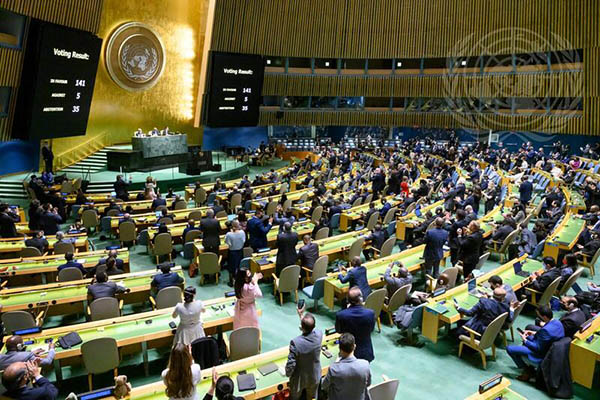
The U.N. General Assembly overwhelmingly adopts a resolution demanding that Russia immediately end its military operations in Ukraine. U.N. Photo—Loey Felipe
Nonbinding resolution ‘deplores’ Russia’s invasion and calls for Moscow to immediately withdraw its troops from Ukraine
The U.N. General Assembly on Wednesday adopted, with an overwhelmingly majority, a resolution demanding Russia “immediately” withdraw its troops from Ukraine, with Pakistan abstaining from the vote as part of its “neutral” position.
Apart from Pakistan, China, India, Iraq, Bangladesh, and South Africa were among the 35 countries that abstained from the vote. Just five countries—Eritrea, North Korea, Syria, Belarus, Russia—voted against the resolution, while 141 member states of the U.N. voted in its favor.
In a statement delivered in the UNGA after the vote, Pakistan’s Permanent Representative at the U.N. Munir Akram called for dialogue and de-escalation. “Prime Minister Imran Khan has regretted the latest situation between Russia and Ukraine, and said that Pakistan had hoped that diplomacy could avert military conflict,” he said, adding that Islamabad had “repeatedly” called for “de-escalation, renewed negotiations, sustained dialogue, and continuous diplomacy.”
Claiming that Pakistan was “committed to the fundamental principles of the U.N. Charter: self-determination of peoples, non-use or threat of use of force, sovereignty and territorial integrity of States, and pacific settlement of disputes,” Akram added: “Equally, Pakistan upholds the principle of equal and indivisible security for all. These principles must be consistently and universally respected.”
Stressing that Islamabad was most concerned about the safety and welfare of Pakistani citizens and students in Ukraine, the envoy hoped people still stranded in the conflict zone would soon be evacuated. He said Pakistan appreciated the cooperation of Ukrainian authorities, as well as the Polish, Romanian and Hungarian governments in helping its evacuation efforts.
“All efforts must be made to avoid further escalation of violence and loss of life as well as military, political and economic tensions, which can pose an unprecedented threat to international peace and security and global economic stability,” he said, adding that Pakistan hoped talks between Russia and Ukraine would succeed in bringing about a ceasefire. “A diplomatic solution in accordance with relevant multilateral agreements, international law, and provisions of the U.N. Charter is indispensable,” he said, adding that “Pakistan also supports all efforts to provide humanitarian relief to civilians in the affected areas.”
UNGA session
The UNGA resolution was adopted after two days of debate in which a majority of nations took aim at Russia for invading Ukraine, with the Ukrainian ambassador accusing Russia of genocide. In addition to condemning the invasion, the non-binding resolution also deplores President Vladimir Putin’s decision to put his nuclear forces on alert.
“They have come to deprive Ukraine of the very right to exist,” Ukraine’s ambassador Sergiy Kyslytsya told the Assembly ahead of the vote. “It’s already clear that the goal of Russia is not an occupation only. It is genocide.”
The European Union’s ambassador to the .U.N Olof Skoog said the vote was “not just about Ukraine,” stressing it was about “defending an international order based on rules we all have signed up to.”
U.N. Secretary-General Antonio Guterres said the General Assembly’s message was clear: “End hostilities in Ukraine—now. Silence the guns—now.” He warned that the situation was a “ticking time bomb” that threatened to worsen if it was not halted.
Nearly every General Assembly speaker unreservedly condemned the war though Russian ally Belarus offered a staunch defense of the invasion. Alongside other Russian allies such as Syria, its envoy condemned the “double standards” of Western nations who have invaded countries including Libya, Iraq and Afghanistan in recent decades.
Putin launched the full-scale invasion of Ukraine on Feb. 24. Moscow has claimed “self-defense” under Article 51 of the U.N. Charter, but this has been rejected by Western countries, who accuse Moscow of violating Article 2 of the Charter, requiring U.N. members to refrain from the threat or use of force to resolve a crisis.
